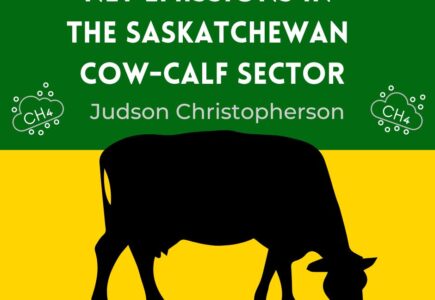Analyzing the net emissions of the cow-calf sector
By: Judson Christopherson,
University of Saskatchewan Master’s student
Agriculture is facing the challenge of feeding an ever-growing population, which just surpassed 8 billion. Some estimates indicate that food production will need to rise by 70% in the coming decades, without a significant expansion in agricultural land area. Adding to this formidable objective, is that environmental impacts will need to be accounted for and measured, to ensure the food production meets sustainability goals to improve the health of our habitat for future generations . Agriculture is often perceived as a detriment to the welfare of the environment in popular media, with beef production facing the brunt of the calls for change . Research analyzing the net emissions of cow-calf production and the beef industry as whole must be broadened to provide a more accurate understanding of beef productions’ contribution to climate change mitigation targets. As a beef producer, I know our industry is rapidly evolving to enhance environmental outcomes while reaching our production goals. However, this is a story that needs to be told beyond the coffee shops, conferences, and livestock shows; our Saskatchewan beef sustainability story needs to be further broadcast, reaching consumers and policy makers. This is exactly the objective of my M.Sc. thesis, to quantify the ways in which ranchers protect their greatest resource, the environment.
This research will serve to fill an existing gap that exists in the quantification of net greenhouse gas (GHG) emissions from forage production using current technology and practices. Particularly, carbon sequestration resulting from forage production requires further analyzed to improve understanding of the relation between GHG emissions and livestock feed production.
A survey will be employed to gather data pertaining to chemical use, cropping selection, fertilizer applications, machine employment, amongst other production practices. The collected data will provide a robust dataset upon which analysis will be undertaken to determine the net carbon emissions of livestock feed production. The data will provide a picture of how Saskatchewan beef producers’ have implemented sustainable production practices over the past three decades. Modelling will evaluate the carbon sequestered by feed production, changes in emissions over time, and emphasize the importance of what our beef producers are doing to be exemplary environmental stewards. This will enable the development of a net carbon figure that is representative of the population of cow-calf producers in Saskatchewan. It is anticipated that these results can be extended to areas where similar production practices and climates exist, namely the western Canadian prairie region.
Research opportunity
My M.Sc. thesis research will provide a comprehensive view of the contribution of production level decision-making in Saskatchewan’s cow-calf sector to Canada’s climate mitigation strategies, informing policymakers at the national and provincial level, about improved environmental outcomes in agriculture without imposing productivity declines. To undertake this research, I need your assistance. If you want to add your voice to this important conversation, please register to take the survey here. The generous donation of your time will be compensated monetarily, and the by-product of your support will be a representation of your land stewardship efforts on the academic and political stages.

